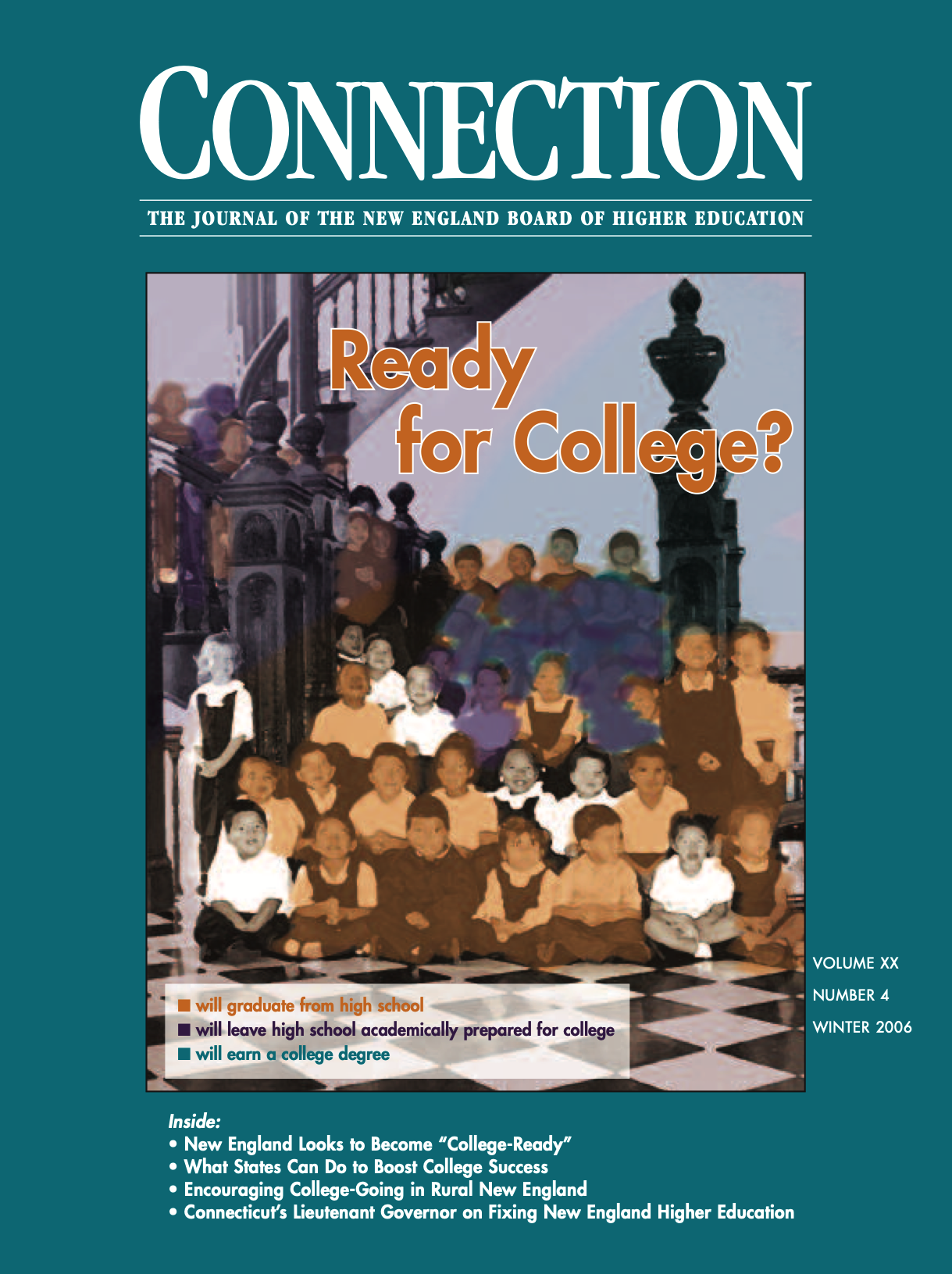
Click the cover image to view and download this issue in PDF format.
BOSTON—The Winter 2006 issue of Connection: The Journal of the New England Board of Higher Education explores issues in “college readiness,” ranging from efforts to align K-12 standards with college admissions requirements to grassroots initiatives aimed at helping urban and rural populations prepare for and succeed in college.
Authors include: Richard Kazis of Jobs for the Future; Andrea Venezia of the National Center for Public Policy and Higher Education; Michael Poindexter of the Community College Of Rhode Island; Greg Johnson of Bottom Line; Stephen E. Abbott of the Great Maine Schools Project; Blenda J. Wilson of the Nellie Mae Education Foundation; Michael Thomas of nebhe; and others.
The issue also features an exclusive commentary by Connecticut Lieutenant Gov. Kevin B. Sullivan on challenges facing New England higher education.
Connection is the journal of the nonprofit New England Board of Higher Education—and America’s only regional journal on higher education and the economy.
Among articles in the Winter 2006 Connection:
-
- Reform for College Readiness • nebhe President and CEO Evan S. Dobelle proposes that New England boost college readiness in poorer school districts by ending reliance on inequitable local property taxes to fund schools. “By relying to any considerable extent on local communities to fund local schools, we condone unequal education by class and race,” writes Dobelle, adding, “that costs us dearly in the in the long run, as less-educated citizens incur higher health care costs than their college graduate neighbors, put more strain on public assistance and criminal justice programs and give back less in taxes and charitable donations.”
- Ready Yet? • Connection Executive Editor John O. Harney’s quarterly “Editor’s Memo” outlines the issues swirling around “college readiness” and asks whether it’s time for a national service strategy “not only as a way to revive civic engagement and add a check and balance to military misadventures, but also as a way to universalize college readiness.”
- Building a Pipeline for College Access and Success • Richard Kazis, senior vice president of the Boston-based nonprofit, Jobs for the Future, notes that the lower a student’s family income is the more likely a combination of family background and sub-par schools will leave that student unprepared for college whether they earn a high school diploma or not. “State policies must be reformulated, starting from a clearly stated goal that all young people in the state should leave high school prepared to succeed in college and that the state will henceforth regard K-12 and higher education institutions as part of the same pipeline to success for the state’s residents,” writes Kazis.
Levers for Change • Andrea Venezia, senior policy analyst at the National Center for Public Policy and Higher Education, outlines steps that states can take to better align high school and college and improve college readiness. “Reforms cannot be effective if they are simply grafted onto existing policies that divide education systems by level,” warns Venezia.
- What Does It Mean to Be “College-Ready?” • Laurie L. Hazard of Bryant University and Jean-Paul Nadeau of Bristol Community College, coauthors of the book Foundations for Learning, explain how young people can develop the habits of mind to succeed in college.
- Are Colleges Listening to Students? • Michael C. Poindexter, vice president of student affairs at the Community College of Rhode Island, urges colleges to listen to students and factor their needs into institutional priorities.
- Short Shrift for Staffing Student Support • St. Vincent’s College President John K. Fisher and Vice President Joanne R. Wolfertz explore how small New England colleges staff various campus offices. Their chief finding: Those offices that bear a direct relationship to generating revenue enjoy robust staffing. In contrast, support services such as student counseling are thinly staffed.
- College Ready New England • nebhe Vice President Michael K. Thomas explains how the College Ready New England initiative is developing regional strategies for college access and success.
- College Graduation Is the Bottom Line • Most students graduating from Boston public high schools are not ready for college academics, asserts Greg Johnson, executive director of the Bottom Line. Johnson explains how the small nonprofit in Boston’s Jamaica Plain neighborhood is helping urban students become academically, financially and socially prepared for college—and sticking with them all the way through to graduation.
- Adults Must Be College-Ready Too • Adults with no college education are hard-pressed to find good jobs and keep their families out of poverty in today’s economy. Blenda J. Wilson, president and CEO of the Nellie Mae Education Foundation, explains how a network of adult basic education (ABE)-to-college transition programs are inspiring New England adults to take advantage of a second chance.
- College Material • Stephen E. Abbott of the Great Maine Schools Project explains how Maine is reaching out to underserved rural students with innovative strategies including Early College High Schools, allowing high school juniors and seniors to take classes at nearby colleges and earn both high school and college credit.
- New Hampshire’s Get Ready for College Initiative • University System of New Hampshire Chancellor Stephen Reno and New Hampshire Higher Education Assistance Foundation President René A. Drouin explain the state’s new comprehensive effort to encourage students in grades 6 through 12 to aspire to and prepare for college.
- Fix Higher Education … Before It Breaks! • Connecticut Lieutenant Gov. Kevin B. Sullivan outlines challenges and opportunities for New England. Among other things, Sullivan suggests: “It may be time to broaden the 50-year-old New England Higher Education Compact that created nebhe into a reinvigorated Northeastern partnership including New York and New Jersey.”
[ssba]
